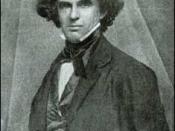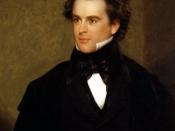In Nathaniel Hawthorne's story, "My Kinsman, Major Molineux" his writing style revels his feelings toward Major Molineux. There are several ways to determine how Hawthorne felt about Major Molineux. His diction, tone, and selection can help evaluate the author's attitude towards Robin's kinsman.
Hawthorne chooses certain words and uses them in, either a positive or negative connotation to express to the reader his feelings for a character. One example, "...and there, in tar-and-feathery dignity, sat his kinsman, Major Molineux!" Hawthorne is telling the reader that although the Major has been humiliated, he still retains some dignity within himself. The phrase tar-and-feathery dignity is an oxymoron, yet Hawthorne decided to combine them. This shows the reader that maybe Hawthorne believed that Major Molineux didn't deserve the treatment he received as much as the townspeople thought he did.
In addition, some of the phrases throughout the story help the reader create certain feelings toward a character, or express the author's feelings for a character.
Hawthorne chose the phrase "...the trumpets vomited a horrid breath..." to express to the reader that the trumpets suddenly stopped playing. He wanted to give the reader a clear picture of the situation presented that night. This might tell the reader that the story has stopped and will take a different turn. It could also give the reader a feeling that something is about to happen to the main character. It shows that Hawthorne wanted to make the moment before the Major's entrance a dramatic one.
Sometimes the way a sentence is written or the words used may cause the reader to develop concrete images about the story and what is taking place within it. The reader develops certain images to help them understand the story. For example, "His face was pale as death, and far...


